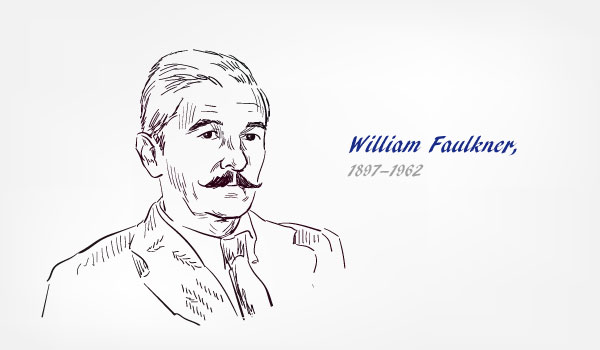
Ladies and gentlemen,
I feel that this award was not made to me as a man, but to my work—life's work in the agony and sweat of the human spirit, not for glory and least of all for profit, but to create out of the materials of the human spirit something which did not exist before. So this award is only mine in trust. It will not be difficult to find a dedication for the money part of it commensurate with the purpose and significance of its origin. But I would like to do the same with the acclaim too, by using this moment as a pinnacle from which I might be listened to by the young men and women already dedicated to the same anguish and travail, among whom is already that one who will someday stand where I am standing. Our tragedy today is a general and universal physical fear so long sustained by now that we can even bear it. There are no longer problems of the spirit. There is only the question: When will I be blown up? Because of this, the young man or woman writing today has forgotten the problems of the human heart in conflict with itself which alone can make good writing because only that is worth writing about, worth the agony and the sweat. He must learn them again. He must teach himself that the basest of all things is to be afraid; and, teaching himself that, forget it forever, leaving no room in his workshop for anything but the old verities and truths of the heart, the universal truths lacking which any story is ephemeral and doomed—love and honor and pity and pride and compassion and sacrifice. Until he does so, he labors under a curse. He writes not of love but of lust, of defeats in which nobody loses anything of value, of victories without hope and, worst of all, without pity or compassion. His griefs grieve on no universal bones, leaving no scars. He writes not of the heart but of the glands. Until he learns these things, he will write as though he stood among and watched the end of man. I decline to accept the end of man. It is easy enough to say that man is immortal simply because he will endure: that when the last ding-dong of doom has clanged and faded from the last worthless rock hanging tideless in the last red and dying evening, that even then there will still be one more sound: that of his puny inexhaustible voice, still talking. I refuse to accept this. I believe that man will not merely endure: he will prevail. He is immortal, not because he alone among creatures has an inexhaustible voice, but because he has a soul, a spirit capable of compassion and sacrifice and endurance. The poet's, the writer's, duty is to write about these things. It is his privilege to help man endure by lifting his heart, by reminding him of the courage and honor and hope and pride and compassion and pity and sacrifice which have been the glory of his past. The poet's voice need not merely be the record of man, it can be one of the props, the pillars to help him endure and prevail.
各位先生女士:
我感到這個獎項並不是授予我個人,而是授予我的這份工作的—我這份職志的工作,是在人類內心極大痛苦與焦慮中進行的,不是為了名,不是為了利,而是為了從人類的靈魂中汲取素材,創造出一些東西來。因此,這個獎項我只是代為託管罷了。 要講出與獎金同等重量,並符合獎項精神的獻詞,並非難事。但我想利用這個時刻,利用這個舉世矚目的講壇,對那些與我有著同樣痛苦與艱難的青年男女致意,在他們之中,有人日後也必將站在我現在所站的地方。 我們今天的悲劇是,外面的世界長期普遍瀰漫著恐懼,我們也都習慣了這種恐懼。現在浮現的不再是心靈上的問題,人們唯一擔心的問題是:我什麼時候會遭受到攻擊?也因為如此,現在年輕人在寫作時都忘記了人類心靈本身的內在衝突,而只有這種內在衝突的題材才能寫出好的作品,才是值得著墨,值得嘔心瀝血去創作的。 他必須重新學習去讓自己明白:恐懼其實是最不足為道的。他必須學習將恐懼永遠驅逐出去,讓作品中只存在心靈中亙古不變的真理。缺少了這些普世的真理—愛、榮譽、憐憫、自尊、仁慈和奉獻—任何小說都只是浮光掠影,不會成功。 如果沒有做到這些,他是在詛咒之下工作。他描寫的愛,會變成情欲;他描寫的失敗,實則毫無所失;他描寫的成功,透不出絲毫的希望;最慘的是,作品之中毫無憐憫或慈悲。他描寫的悲傷不是為了世上的生靈,無法留下深刻的痕跡。這樣的作品不是來自心靈,而是來自腺體的分泌。 寫作者在尚未重新認識這些之前,他在寫作時會好比是站在人群之中,目睹著世界末日。我並不認同世界末日的說法,我倒寧可說人類會世世代代地延續下去。即使最後一位人類的喪鐘已經敲響,鐘響在落日的餘暉中,消失在海潮最後退去的崖邊—即使是在這樣的時刻裡,仍然還可以聽到人類綿延不斷的微弱說話聲。 我不認同世界末日的說法,我認為人類不僅會繼續延續下去,而且會愈來愈好。人類會永恆的延續下去,不只是因為萬物之中人類綿延不斷的說話聲,更是因為人類擁有靈魂,具有慈悲、奉獻和堅忍的精神。 詩人和作家的責任,就是把這些東西寫出來。提昇人們的心靈,喚醒人類向來所擁有的光榮—勇氣、榮譽、希望、自尊、慈悲、憐憫和奉獻—以幫助人類繼續延續下去,這就是寫作者的殊榮。詩人不應該只是寫寫人類的生活記錄,詩人應該成為人類的中流砥柱,幫助人類延續、繁榮下去。 |
沒有留言:
張貼留言